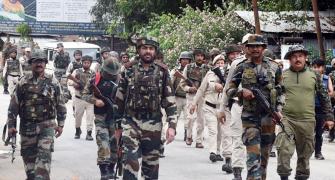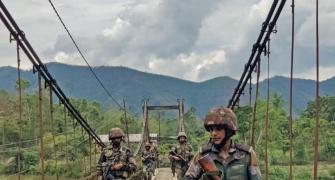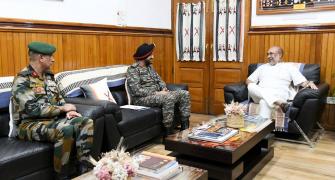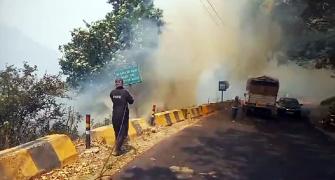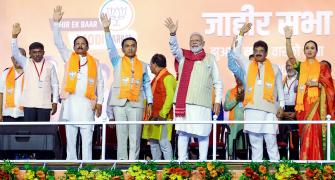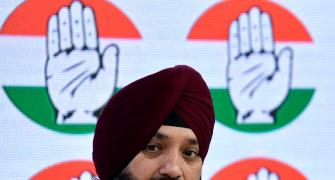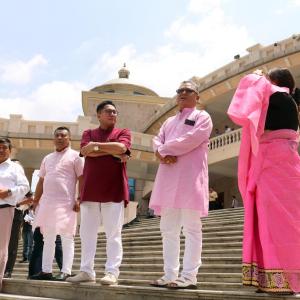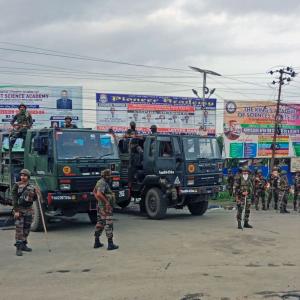'Unfortunately, there is no movement towards peace in Manipur.'

"There are long histories of problems between the tribes in Manipur. They don't trust each other and are extremely wary.
"Usually, political changes are brought about by the youth, but presently Meitei and Kuki youth are at war with each other," says retired Lieutenant General Shokin Chauhan (retd), former director general of the Assam Rifles, the country's oldest and largest paramilitary force.
General Chauhan, a third generation army officer, was chairman of the Ceasefire Monitoring Group to ensure peace in the North East.
The officer has served for nearly 15 years in the North East over five different tenures. He has vast experience in conducting counter terrorist operations both in Kashmir and the North East, and served as the DG of the Assam Rifles for 16 months.
"Assam Rifles probably has the most difficult task among all Central Armed Police Forces and has discharged its duties excellently. It is the only organisation keeping the peace and has prevented mass scale genocide on both sides," says the distinguished military officer in the first part of a Zoom interview with Rediff.com's Archana Masih.
As an officer who has served long and important tenures in the North East, what are the historical reasons behind the inter-tribal clashes that have continued for six months in Manipur?
We need to know the background of Manipur to understand the present situation.
In the late 1700s Manipur was occupied by the Burmese empire and the king of Manipur sought the help of the British. The British and the Burmese fought three Anglo-Burma wars and by 1868 Burma became a part of the British empire.
After the British occupation, Manipur became a British protectorate resulting in many tribes migrating from northern and upper Burma towards Manipur for better prospects, land and water.
The Meitei king and the people had to learn to share the land with the migrants who arrived during the 17th, 18th, 19th and 20th centuries.
Post-Independence, Manipur came to be inhabited by three main tribes -- Meitei which are about 54%-55%, Nagas and Kukis, the latter were about 14% during Independence and maybe are 16%-17% presently. There has been no survey done [since 2011] to indicate the exact numbers.

What are the main issues and misgivings between the Meitei and Kukis?
Every flashpoint in the North East revolves around three main issues:
1. Land: Tribal land in the North East is in the hand of tribal societies. This is stated in Article 371, A, B, C, D of the Constitution.
In Manipur, in accordance with these special provisions, the Nagas and Kukis own the land in the hills where they live. While the Meiteis own the land in the valley.
All the tribes in the North East are designated as scheduled tribes; however, the scheduled caste status was not given to the Meiteis. This could either be because they didn't want it in 1947-1948, or because they were better off than the rest of the people.
But over the last 20 odd years, the Meiteis feel that they have been cheated of the scheduled caste status which would in turn have helped in securing government jobs and also give them access to tribal lands.
2. Political power: The Meiteis are the most populous and dominant community. Except the brief period of Rishang Keishing who was a Tangkhul Naga, Meitei chief ministers have always headed the state government.
Since Kukis had the status of scheduled tribes and scheduled castes, they got reservations in state jobs and as a result, moved up the ladder in the police and state administration. This also enabled Kukis to move from the hills towards the valley.
3. Cultural Identity: The Kukis came to Manipur only in the last three centuries, though they say that some Kukis fought for the Raja of Manipur in the 15th and 16th centuries, but the fact is that the majority of the Kukis came to the state in the last 300 years.
They have not been accepted in society because Meiteis feel that they have come in later and didn't deserve the land they made their own.
All issues in Manipur and the North East originate from land, cultural identity, and political power.
That is the root problem between the Meiteis and Kukis.
The Kukis had also settled in Ukhrul which is claimed by the Tangkhal Nagas. I was a young company commander posted there in the late 1980s. We were protecting the few Kuki villages because the Tangkhal Nagas had declared war on them.

What is different about the problem this time as compared to tribal feuds of the past?
What were the immediate triggers for the intra-tribal clashes?
The immediate conflagration was on April 24 when the chief minister wanted to inaugurate an open gym in Churachandpur and there was disturbance in the valley.
Subsequently, on May 3-4, assailants set fire to the Anglo-Kuki memorial which is sacred and commemorates the Kukis who fought against the British before the First World War.
This incident added fuel to an already incensed crowd and created mayhem in the state.
The Meiteis feel that they are going to lose out on political power one day which is incorrect because they are 54%-55% of the population, but sometimes people are manipulated by politicians who make them insecure because that's the only way to get political support.
Secondly, like I said, as per the Constitution, those tribal lands are not available because the tribal societies own it and there was a push from the state government to declare certain areas as reserved forests that would have edged the Kukis out.
Why is there no resolution to the current problem that is seeing recurring violence over the past six months?
There are long histories of problems between the tribes. The different tribes and communities don't trust each other. They have been brought up on tales that have widened the divide and are extremely wary of each other. They live in separate areas.
Since the Meiteis are the dominant tribe, Kukis feel that they were being pushed out.

Why is there no end to this violence that has taken nearly 180 lives?
The violence can't end till the people from both societies get together and decide to end this violence.
Meitei and Kuki elders must sit together and say, let's end this violence. Usually, political changes are brought about by the youth, but presently Meitei and Kuki youth are at war with each other.
Unfortunately, I don't see any movement towards peace. Politically, the Biren Singh government has lost credibility amongst the Kukis and the Kukis are not going to listen to him.
The situation on the ground has to change to give peace a chance.

As former director general of the Assam Rifles, what are your thoughts about the challenges faced by the Assam Rifles in the last six months in Manipur>
Let me put it on record that the Assam Rifles is probably the best fighting force in the country today and equals any Indian army unit in its capability.
We have deployed the Assam Rifles extensively in Kashmir. They have also served in Sri Lanka and conducted successful operations against the LTTE in their areas of operations. They are an extremely experienced organisation.
The Assam Rifles has discharged its duties excellently and is the only organisation keeping the peace. It has prevented mass scale genocide on both sides and stopped many revenge operations.
The force is deployed in the North East, but it recruits personnel from different castes, communities from the entire country at the same percentages as the recruits of the Indian Army.
It probably has the most difficult task among all Central Armed Police Forces and they have done it with a smile.
Assam Rifles probably has the most difficult task among all Central Armed Police Forces and they have done it with a smile.
- Part 2 of the Interview: 'Matter of time before China starts creating problems'
Feature Presentation: Aslam Hunani/Rediff.com

